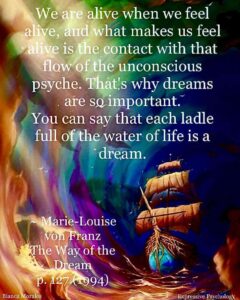

A Lesson on Aging
I’m so happy to be back in the mountains. I love the weather, the trees, the birds, the rushing creek, the flowering bushes. The beauty.


I’m so happy to be back in the mountains. I love the weather, the trees, the birds, the rushing creek, the flowering bushes. The beauty.

Hello friends. Yes, I’m very alive and well. And having some fascinating dreams. I hope you are too. For the last few months I’ve been

“The gigantic catastrophes that threaten us today are not elemental happenings of a physical or biological order, but psychic events. To a quite terrifying degree
Website design and development by Chad Lieberman
0 Responses
Thank you very much, Jean. A lovely post. I am enjoying most your topics. Since for the most people it would be easier said than done (below in bold), I thought you may wish to advise the people reading your blog about the following.
http://www.amazon.com/No-Death-Fear-Comforting-Wisdom/dp/1559278048/ref=tmm_abk_title_0?ie=UTF8&qid=1413865340&sr=8-1
He just speaks on the same topic of death and Life. Very inspirational.
I am sorry about your father.
Francesca
id3
Hello, Francesca,
I’m glad you enjoyed the post and thank you for the link. I’ve given this book to friends and family. Thich Nhat Hanh is a wise teacher, and I would highly recommend him.
Best, Jeanie
So sorry to hear about the loss of your loved one, many condolences and wishing your family much strength for the future, Jean.Thank you also for a wonderful gift of a post. As often, your thoughts came to me at a rather synchronistic time and as Deepak Chopra advises, be grateful for synchronicities, they are gifts from God (or consciousness or the Universe etc). Owning the shadow and taming it seems to take an awfully long time, but the rewards are many and life is definitely enriched. Take care and thanks again. Roberta
Hello, Roberta,
You’re very welcome. Synchronicities are the best guidance ever, aren’t they? And yes, the Shadow is the challenge of a lifetime…..or two, or three. 🙂 But coming to terms with it brings rare comfort and freedom to enjoy life. Thanks so much for staying in touch, my friend.
Jeanie
Dear Jean, I am profoundly grateful for your thoughts. You have described my parallel path, at 67 rather than 36. Rather than the certainties of Catholic dogma and beliefs, I now live with Mystery, within and without. And, yes, the symbol of a lamp in a dark place, a light in the eye, a star against a night sky; I hope these stay on for all of us on our journey to and across the threshold that we call ‘death’.
Dear Catherine, It’s good to hear from another like-minded traveler. Although ours is not an easy way, there are many more of us who, having opened to and tasted Mystery, prefer it to the closed container of certainty. I, too, am grateful to the archetypal symbols you mention for their power to bring guidance, hope and comfort. Thank you for writing, sister.
Once again, Brian Carlin’s comments on this post do not show up here. What’s up, WordPress? I’ve copied them below:
“Morbid”, with its suggestion of unhealthy or diseased thought processes,is furthest from your attitude to death. More those who can’t find it in themselves to contemplate their mortality. The morbidly happy ones.
That you can touch on the subject with such grace and understanding, has me touched by the unerring deftness of your tone.
The illustration sent me back to the old childhood hymn “Jesus bids us shine”
“Jesus bids us shine with a pure, clear light
Like a little candle, burning in the night
In this world of darkness, so let us shine
You in your small corner, and I in mine”
Which led to me thinking of the childlike truth here outshining the petulant
“Rage hard against the dying of the light!” of Dylan Thomas.
There is a part of Bachelards Poetics of Space, where he remarks on the perceived fragility but security of the nest. I think somewhere in there is the secret of acceptance of our mortality.
As usual you give me much to work on 🙂
And you, me, Brian.
Thank you so much for this beautiful comment. Your recognition of the work I put into setting the right tone is especially meaningful to me. It affirms my ongoing struggle to see and understand my Shadow, whose less-than-noble qualities I won’t list here lest they cause you or my other readers to think less of me!! 🙂
I have a similar childhood hymn:
“This little light of mine, I’m gonna let it shine.
This little light of mine, I’m gonna let it shine.
This little light of mine, I’m gonna let it shine.
Let it shine, let it shine, let it shine.
Hide it under a bushel? No! I’m gonna let it shine. Etc.”
Writing this post was actually another attempt to let my light shine. Not always easy, but with comments like yours and those above, totally worth it!
Aaah, the comfort of the nest. Alas, I must leave mine now for an appointment with my chiropractor!
Thank you, friend.
Jeanie
In response to your fine thoughts above I’ll share this: I’ve always liked melancholy music and wondered if it’s connected to being born in late autumn or being aware of a foreshadowing of death. But reading your thoughts here (about light in the eye & consciousness) it doesn’t seem that melancholy is a foreshadowing of ‘One Universal Conscious Mind.’ Or is it possibly? What do you think?
What an interesting question!! Let me play with it a little…
I’ve always loved melancholy music too….usually in minor keys! But I was born in April. Maybe that’s why I love rain, which also puts many people in melancholy moods.
Actually, I think people who like melancholy music might just naturally have a melancholic temperament. If you recall, Hippocrates believed that there are four basic personalities or temperaments: sanguine (pleasure-seeking and sociable), choleric (ambitious and leader-like), melancholic (analytical and quiet), and phlegmatic (relaxed and peaceful). (I just got this from Wikipedia. Also according to Wikipedia: “Hans Eysenck (1916–1997) was one of the first psychologists to analyze personality differences using a psycho-statistical method (factor analysis), and his research led him to believe that temperament is biologically based. The factors he proposed in his book Dimensions of Personality were Neuroticism (N) which was the tendency to experience negative emotions, and the second was Extraversion (E) which was the tendency to enjoy positive events, especially social ones. By pairing the two dimensions, Eysenck noted how the results were similar to the four ancient temperaments.”
So maybe there’s some truth to this theory, although medical science in general does not hold with it. At any rate, I tend toward the N side, as do many introverts and creative people, and I think I was simply born this way, which might explain my lifelong enjoyment of melancholy music, poetry, art, solitude, etc. Wikipedia also says, “The melancholic temperament is traditionally associated with the element of earth. People with this temperament may appear serious, introverted, cautious or even suspicious. They can become preoccupied with the tragedy and cruelty in the world and are susceptible to depression and moodiness. They may be focused and conscientious. They often prefer to do things themselves, both to meet their own standards and because they are not inherently sociable.” Much of this describes much of me.
I’m thinking that perhaps all these qualities lead to a tendency to think more about dying and be more aware of death than a person with a dominantly “sanguine” personality who rarely thinks about such things. But if I understand you correctly, you’re wondering if such a positive interpretation of death as mine wouldn’t naturally go with a more positive personality type? Or could melancholy actually be a foreshadowing of One Universal Conscious Mind?
I’m thinking it could. If melancholia is connected with more serious reflection and the tendency to experience negative emotions, and if melancholic types are also analytical and philosophically-minded, then they would naturally spend more time than other types thinking about and even investigating death-related issues. Perhaps it is one’s personal experience with the darker side of things that eventually leads him/her to study theories and explanations of death proposed by spiritual people as well as physicists, many of whom focus on the phenomenon of light as being the basis of life. “Life is based on absorption and processing of light quanta” is one of the first quotes I found when I googled this topic. And I’ve read variations on this idea by many learned scholars. So in this regard, melancholy may well be a foreshadowing of “One Universal Conscious Mind.”
Have I answered your question or have I completely misunderstood it? 🙂 Either way, it’s been fun!
I think you not only understood my question :- ) but filled out the dimensions of the question in ways that answer with a large and richly detailed landscape. Your reply has given me a great deal to consider and I’ve read it three times already and (because I process information slowly) will read it and contemplate further. Thank you so very much!
It was my pleasure, Steven. I love this kind of question. By the way, an extraordinary film titled “Melancholia” came out a few years ago that I still can’t get out of my mind. It’s about a woman who has bouts of deep, dark depression. Everyone around her thinks she’s the sick one, yet she’s light years ahead of them all in terms of consciousness. Her suffering is caused not by weakness, but by being the only one with the courage to face an intolerable truth. This seems related to our theme.
I have two gifts for those of you who have been following these comments:
First, from poet Brian Carlin: http://theprimate.wordpress.com/2014/10/22/home-space/
Second, from poet Steven McCabe: http://poemimage.wordpress.com/2014/10/22/rays-of-an-ancient-light-driving-you-home/
Enjoy.
Funny how the same sorts of thoughts go through our minds.
You have my deepest condolences and my kindest thoughts.
Thanks, Viv. 🙂
I can’t leave out Inanna…
Nor can I!
Reblogged this on lampmagician.
Thank you. I hope your readers like it.
Thank you, Elaine. Fred’s doing well, considering. He’s had a long time to prepare himself, considering that Dad lived to 103. 🙂
You sound like an unusually receptive and fearless child in the face of life’s dark side. That aspect of your basic nature obviously matured and served you well as you dealt with your experience of your beloved Vic’s death. And now your marvelous book, Leaning Into Love, is a gift to all who face this mysterious transition. I’d like to provide a link here for those readers who are interested: http://www.amazon.com/s/ref=nb_sb_ss_i_0_13?url=search-alias%3Dstripbooks&field-keywords=leaning+into+love&sprefix=Leaning+into+%2Cstripbooks%2C245
The Tibetans have the right idea about how liberating it is to accept the fact of suffering.. In fact, at the moment I’m writing a post about it.
Yes, Persephone and Inanna have been guides for me as well. And thanks to you, I’m exploring Orpheus now. I’m grateful for my mythic teachers!
Thank you for providing the link to Elaine’s book; I’ve added it to my wish list.
You’re welcome! 🙂
Thank you for this exquisite, deeply moving and very personal post. My sympathy for your family’s loss, and may the process of moving through it receive the blessings of compassion and wisdom. You said at the end: “Different souls have different paths. Some are born to fly; some must explore the ocean depths. The healing way is to stop worrying about whether our way is right or wrong and start facing our personal realities with courage, honesty and love.” This is so true, yet often ignored. (((BIGHUG)))
Thank you, Darla. I appreciate your very kind words. (((BIGHUG))) back at you.
I greatly enjoyed reading your expansion upon individuality when you responded to an above comment through the lens of melancholy. I can imagine the appreciation with which these posts and comments are welcomed by your readers. As I may have mentioned in the past, I have a lengthy WIP that focuses upon the intersection of melancholy temperament & suicide. And, since I trained as a hospice volunteer, views of death also came into play with a paper I wrote last year: http://kitsnk9s.blogspot.com/2014/06/death-borderland-to-bridge.html
I don’t remember you telling me these things about yourself. Thanks so much for the link to your article. I’ve just read it and loved it! For all of you who are interested in this topic, especially if you enjoy discussions about interesting films, I highly recommend it!